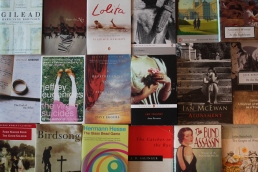I can remember sitting in an English class at secondary school, a long time ago, as my English teacher (incidentally, the best teacher I had at that school) got us to read a short story: Graham Greene’s “The Destructors”. I think it’s a testimony to Graham Greene’s skill that I could still remember the outline of the short story and the effect it had on me when I read it twenty years ago. Anyway, the point is that I still have the short story collection that we used in school all those years ago, so I figured it was about time I reread “The Destructors” and also read the other stories in the book.
This collection is aimed at schools and was first published as part of the Harrap’s English Classics series in 1959, although some of the stories were written some years before this. In the Preface, the editors write that:
In making this selection we chose stories that were not only immediately enjoyable, but worth re-reading because they had so much to offer.
In this aim I think the editors succeeded, as there is much to reflect upon in each of the tales.
The book contains the following short stories:
- “The Secret Sharer” by Joseph Conrad
- “Odour of Chrysanthemums” by D. H. Lawrence
- “The Lumber-Room” by Saki
- “The Daughters of the Late Colonel” by Katherine Mansfield
- “The Machine Stops” by E. M. Forster
- “The Destructors” by Graham Greene
Lack of time prevents me from writing much here at the moment, but certainly each story is thought-provoking. Conrad explores the psychological strain and isolation of a young ship’s captain who is faced with an unexpected situation, and how he struggles to reconcile the expectations of his role and of the external law with what you could call his inner moral law and what he thinks is the more humane thing to do.
D. H. Lawrence covers ground that he explored more fully in some of his more famous novels (that is, the lives of poor workers in a dreary coal mining community), but E. M. Forster’s tale takes us to a futuristic setting that is a world away from the Edwardian well-to-do society settings found in many of his more famous novels.
To my mind the best two stories are the ones by Saki and by Greene. In “The Lumber-Room”, the author contrasts the cruelty, pettiness, and lack of imagination of a “respectable” adult with the inventiveness and simple joy of a child.
In “The Destructors” Greene also focuses on some adolescent boys, but here their “mischief” spirals into something much darker than we might at first expect. The story is set just after the Second World War, and revolves around a two hundred year old London house that had narrowly survived the Blitz. Here there is a distinct lack of innocence amongst the gang of boys and the story raises questions about the effect that living through the violence of war had on children. The tale also highlights the bleakness and the apparent absurdity of life from the perspective of the poor young lads who have little to aspire to. Graham Greene throws together destruction and creativity, violence and careful planning, criminality and dedication in an unexpected and somewhat troubling mix. It is a very powerful and thought-provoking piece.
Apologies for the short review, but tempus fugit and all that.
I will shortly post about another novel I’ve just read, but in the meantime: Happy reading!







